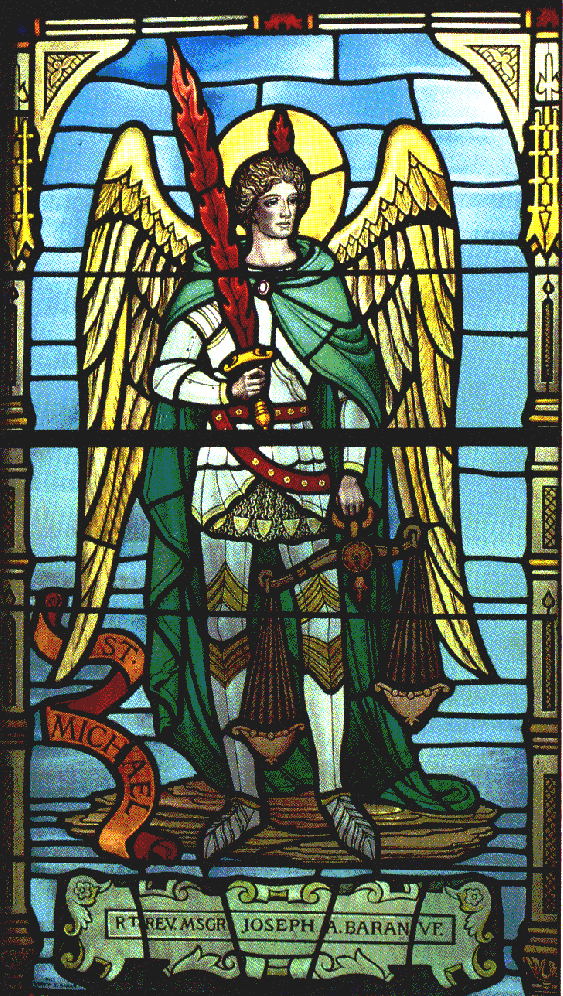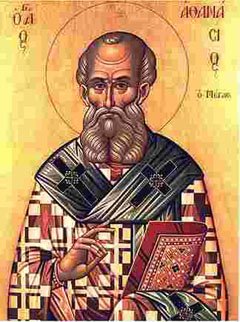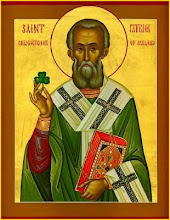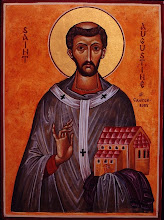A recent article on the weblog Creedal Christian by Fr. Bryan Owen, called "Are You Saved?", touched on the issue of salvation from the perspective of an Orthodox Christian, as opposed to that of a neo-Protestant. In his article, Fr. Bryan mentions the consternation felt by many Episcopalians in addressing this all-important question, and I would venture to say that they are not alone in being unsure of how to respond. I would imagine that a majority of catholic Christians have the same problem in meeting such a query with an answer that expresses their beliefs with clarity and love for the asker. For while such a question is usually asked with the intent to cast doubt on the salvation of one who cannot claim a certain date and time, it is usually also done with the intent to bring one to that certain date and time, and is therefore done out of love and charity, however misinformed or misguided.
Fr. Bryan speaks of the "individualism and neo-gnosticism" which seems to pervade modern protestant theology, and I must say that I quite agree with him. Having been reared in a Southern Baptist church myself, I am well aware of this problem in the "ultra-Protestant, Southern Bible-belt." However, while there are several Baptist doctrines with which I have issues, I find myself wondering if they didn't get a few things right. For that matter, is it not possible that, over the centuries, just as the Protestant view has swung as far as possible from the "catholic," the catholic view has attempted to remain catholic by opposing the Protestant to such an extent that something might have been unintentionally lost?
The Orthodox perspective given by Fr. Bryan in his article and the accompanying video is basically summed up by the following:
*I was originally saved over 2,000 years ago...
*I am being saved, daily...
*I will, Lord have mercy, be saved at the great and final judgment.
A reader left a comment which is worthy of noting, and I hope that he does not mind my reproducing it here:
"If salvation is in large part God's work for the world, and the reason for the Incarnation (Jn 3:16), and if God never ceases working (Jn 5:17) and "was, and is, and is to come" (Rev 4:8) then it is entirely fitting that we should experience salvation in this threefold symmetry...."
I want to be unambiguous is stating that I do not disagree with the above summary; however, I wonder if it is complete.
While there are many instances where the Holy Scriptures speak of the ongoing process of salvation, there are also a number of verses in those same Scriptures that speak of that specific moment in time when we "call upon the name of the Lord (Acts 2:21)" and are saved. Rom 10:9,10 says, "because, if you confess with your mouth that Jesus is Lord and believe in your heart that God raised him from the dead, you will be saved. For with the heart one believes and is justified, and with the mouth one confesses and is saved." S. Paul, in his epistle to the Ephesians, said, "In him you also, when you heard the word of truth, the gospel of your salvation, and believed in him, were sealed with the promised Holy Spirit, who is the guarantee of our inheritance until we acquire possession of it, to the praise of his glory. (Eph 1:13,14)" While none of these verses diminish the truth of the ongoing process of salvation, they speak to that definite time of belief to which the Protestant doctrine refers.
While I must believe that salvation is a process that was accomplished on the cross, is being accomplished in the present, and will be accomplished "at the great and final judgment," I must also believe, from the same source, that there must be a "once-for-all change-of-state in the life of an individual," to borrow from another comment, that marks the beginning of that individual's journey of faith. The fact that one is correct does not necessarily mean that the other is not. I want to reiterate a portion of my own comment to Fr. Bryan's article:
"This disparity between the "catholic" and "evangelical" (to coin the common usages) interpretations has often given me trouble in my own journey. I can't help thinking that the answer lies somewhere in the middle [the via media between the catholic and Protestant], being not an either/or proposition, but one of both/and. The two are not mutually exclusive ideas, but necessarily dependent."
I wonder if a more fitting summary of the process of salvation wouldn't be something like the following:
*The price for my salvation was paid over 2,000 years ago...
*I was saved when I believed...
*I am being saved, daily...
*I will, Lord have mercy, be saved at the great and final judgment.
I welcome your comments.
Pax vobiscum,
Jerry
St. Michael the Archangel

Patron Saint of Police Officers
Saturday, October 3, 2009
On Salvation, Part III
Posted by
Jerry S
at
5:28 AM
![]()
Subscribe to:
Post Comments (Atom)








2 comments:
Jerry, thanks for plugging my posting and for offering your own thoughtful response to the issues raised. This whole business of salvation, while certainly central to our faith, is also one of the trickier ones to fully grasp (or at least that's how I often experience it).
I still like what the Orthodox perspective says about this, but I also think you're making a valid point about the need to subjectively appropriate what has been objectively accomplished by Christ on the cross for our salvation. There does, indeed, seem to be something missing if we don't take into account the individual's role in all of this.
It is objectively true, for instance, that I am "sealed by the Holy Spirit in Baptism, and marked as Christ's own forever" (The Book of Common Prayer, p. 308). It is objectively true that this happened for me on April 27, 1969 ("Good Shepherd Sunday"). And it is objectively true that this happened before my first birthday and thus before I was capable of making any kind of response to the gift of salvation I received in Baptism.
On the other hand, it is also true that, once I got a bit older, I became (and still am) capable of making the choice of saying "no" to this objectively given gift by traveling "to a distant country" and squandering my inheritance "in dissolute living" (Luke 15:13). Or, perhaps less dramatically, I can benignly neglect the gift, assuming that there's nothing I need to do to cooperate with God's work of salvation, putting the gift I've received on a shelf or in a closet, letting it gather dust while I go about the business of being the Lord of my own life.
I can reject the gift of God's acceptance of me. But even if I reject that gift, I cannot destroy it. "The bond which God establishes in Baptism is indissoluble" (The Book of Common Prayer, p. 298). The wayward son can always return to the Father's house. The neglectful can always return to the gift, blow the dust off of it, unwrap the package, take it out, and put it to its God-given use.
So I think we need to account for both the objective and the subjective dimensions of salvation, not as mutually exclusionary, but as complementary.
Fr. Bryan, thanks for your gracious response. Coming from a Southern Baptist church, my baptism came after a profession of faith at the age of twelve (I've never remembered the date...I guess I wasn't a very good Baptist!). That being the case, I've been able to, regardless of my poor memory, trace back to a specific point in time and place my acceptance of our Lord's gift of salvation. For this reason, I tend to have a unique perspective on salvation which lies somewhere between my former church and my current one.
Post a Comment